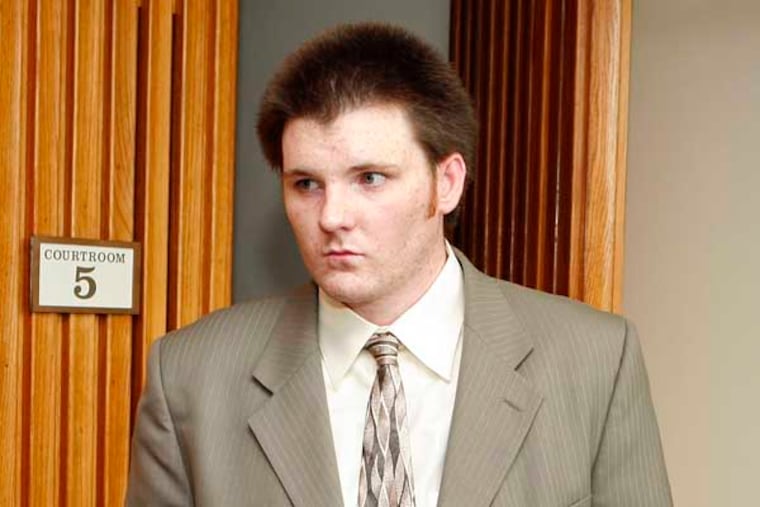Tests show Garrett Reid had illegal steroids at Lehigh
The oldest son of Eagles coach Andy Reid had illegal anabolic steroids in his Lehigh University dormitory room when he died of a heroin overdose Aug. 5 during the team's training camp, Northampton County District Attorney John Morganelli said Monday.

The oldest son of Eagles coach Andy Reid had illegal anabolic steroids in his Lehigh University dormitory room when he died of a heroin overdose Aug. 5 during the team's training camp, Northampton County District Attorney John Morganelli said Monday.
Tests showed that 19 vials found in Garrett Reid's gym bag contained four types of anabolic steroids used for bodybuilding, Morganelli said. The steroids did not contribute to Reid's death, the district attorney said.
Garrett Reid, 29, was an assistant on the Eagles' strength and conditioning staff.
"There is no evidence that he was selling steroids or heroin," Morganelli said. He said that authorities could not determine the source of the drugs found in Reid's body.
Authorities also found 47 syringes and 64 needles, which "could have been all for his personal use," Morganelli said. "It's a matter of speculation" that he might have distributed the drugs.
"People are not going to volunteer that they were using steroids," he said.
The district attorney said he had not been contacted by the NFL about the investigation by Northampton County officials and the Lehigh University Police Department in Bethlehem.
University Police Chief Edward Shupp could not be reached for comment.
"The news today on Garrett Reid's possession of steroids is disappointing," Eagles owner Jeffrey Lurie said in a statement. "It's clear the conduct in which he apparently engaged runs counter to the values and principles mandated for everyone associated with our organization. We have spoken with the league office and have pledged our full cooperation with their requests should there be any. While we remained saddened by the tragic end of a young man's life and know how hard this must be for the entire Reid family, we are extremely confident that Garrett's actions were unknown to those around him and did not involve our football team.
"The NFL has a rigorous drug testing program for its players. It is a matter of record that none of our players has tested positive for any of the steroids mentioned in the district attorney's report."
Eagles team members and staff were interviewed after Garrett Reid's death, but there was no evidence that they knew he was using heroin during training camp, authorities said at the time. Reid's body showed signs of chronic drug use, according to the coroner.
Andy Reid said he was confident that his son's decisions "did not affect our football team in any way."
"I cannot apologize enough for any adverse appearances that my son's actions may have for an organization and a community that has been nothing but supportive of our family," he said in a statement.
Players are tested randomly year-round for the four kinds of steroids that Garrett Reid had, according to an NFL source who asked that his name be withheld.
League officials are aware of Northampton County's findings "and will follow up as appropriate," NFL spokesman Greg Aiello said.
The four types of steroids found in the vials were testosterone propionate, boldenone undecylenate, nandrolone phenylpropionate, and trenbolone acetate. According to a statement issued by the district attorney's office:
Testosterone propionate needs to be injected every two to three days for maximum results. It helps bulk up muscles.
Boldenone undecylenate needs to be injected every three to four weeks and often is used in the offseason because it stays in a user's system longer. It is used to build the body, mass, and muscle.
Nandrolone phenylpropionate takes a long time to "kick in" and clear out of the system.
Trenbolone acetate usually is combined with other steroids to build muscle mass in a short time.
In addition to identifying the contents of the vials, authorities tried but failed to identify the sources of the steroids and heroin, Morganelli said. An investigation of Garrett Reid's cell-phone records did not provide clues, he said.